Intake Manifold Replacement Upper
Removal Procedure
Important: The upper intake does not have to be removed to remove the lower intake
manifold.
- Remove the air cleaner outlet duct from the throttle body. Refer
to
Air Cleaner Outlet Duct Replacement
In Engine Controls.
- Disconnect the accelerator control cable from the throttle shaft
and the accelerator cable bracket. Refer to
Accelerator Control Cable Replacement
in Engine Controls.
- Disconnect the cruise control cable, if equipped from the throttle
shaft and the accelerator cable bracket. Refer to
Cruise Control Cable Replacement
in Cruise Control.
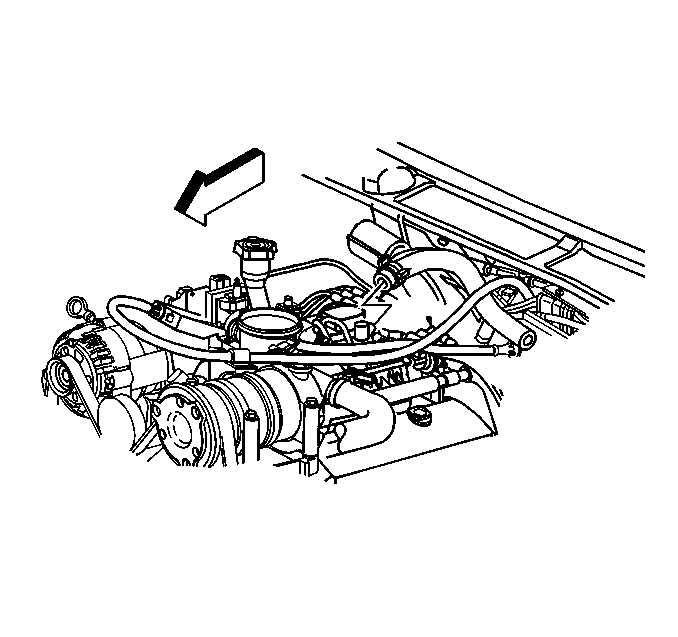
- Disconnect the vacuum
hose from the intake manifold for the vacuum tank.
- Remove the power brake booster vacuum hose.
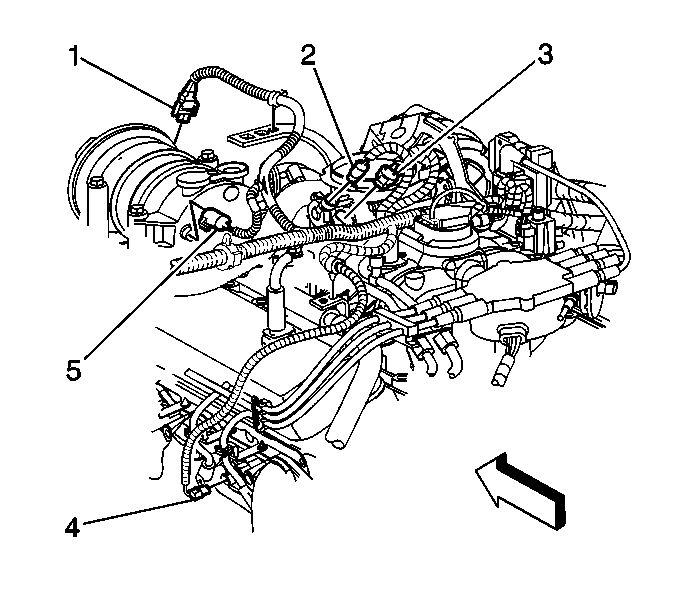
- Disconnect the following
electrical connectors:
| • | The A/C compressor clutch (1) |
| • | The A/C compressor cutoff switch (5), if equipped |
| • | The throttle position (TP) sensor (2) |
| • | The idle air control (IAC) motor (3) |
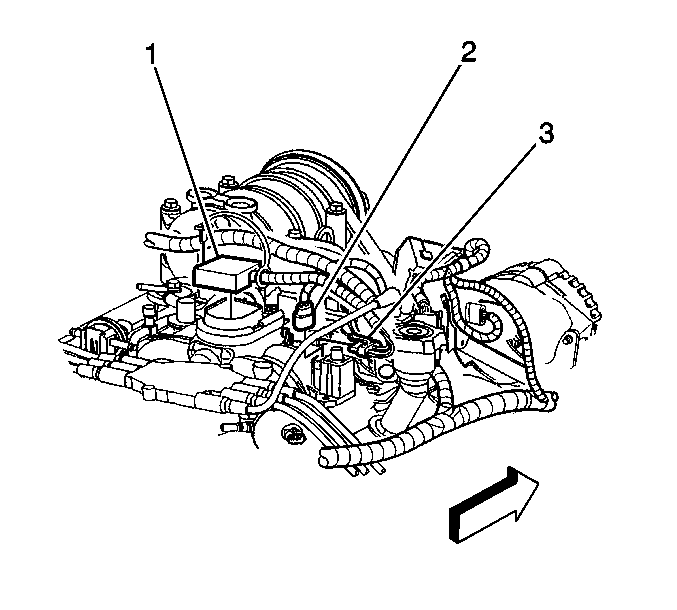
- Disconnect the following
electrical connectors:
| • | The fuel meter body assembly (1) |
| • | The manifold absolute pressure (MAP) sensor (3) |
| • | The EVAP canister purge solenoid valve (2) |
- Remove the engine wire harness clip from the accelerator cable
bracket.
- Move the engine wiring harness aside.
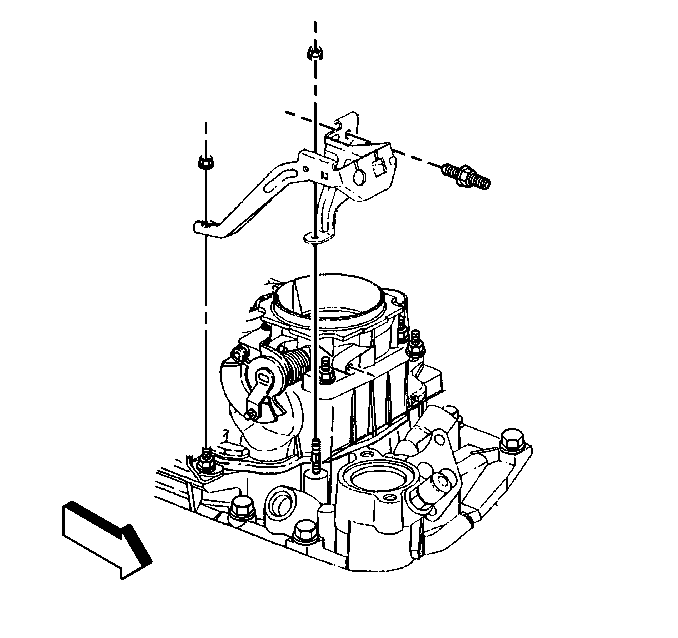
- Remove the accelerator
cable bracket from the throttle body and the intake manifold.
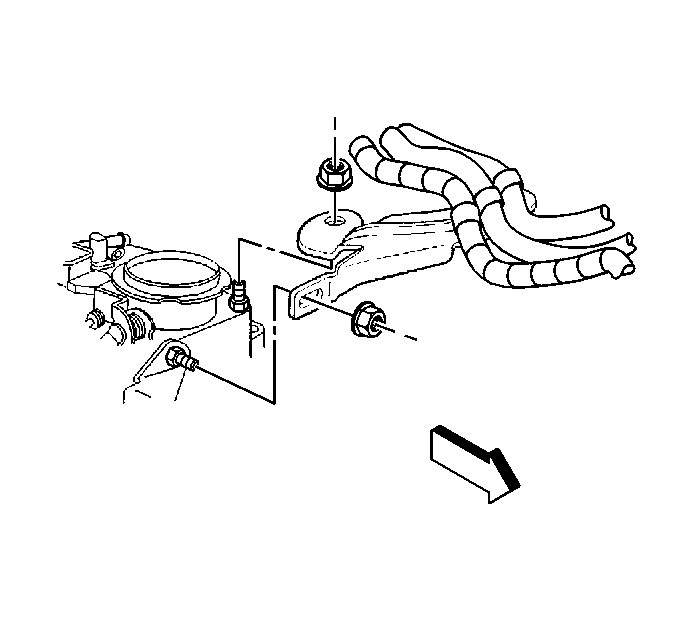
- Remove the accelerator
and cruise control cable bracket from the throttle body.
Leave
the accelerator and cruise control cables on the bracket.
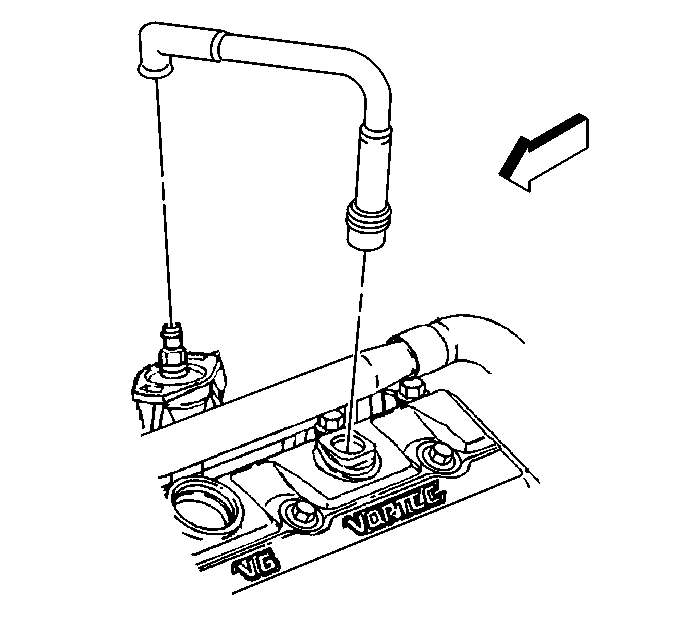
- Remove the PCV valve hose
assembly form the intake manifold and the valve rocker arm cover.
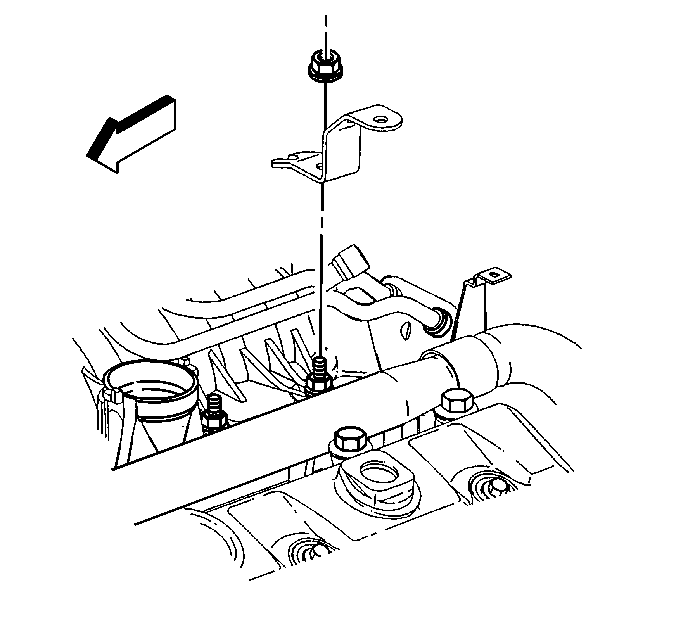
- Remove the bracket for
the engine wiring harness from the intake manifold stud.
- Remove the fuel lines from the fuel meter body assembly. Refer
to
Fuel Hose/Pipes Replacement - Engine Compartment
in Engine Controls.
- Remove the EVAP canister purge solenoid valve. Refer to
Evaporative Emission Canister Purge Solenoid Valve Replacement
in Engine Controls.
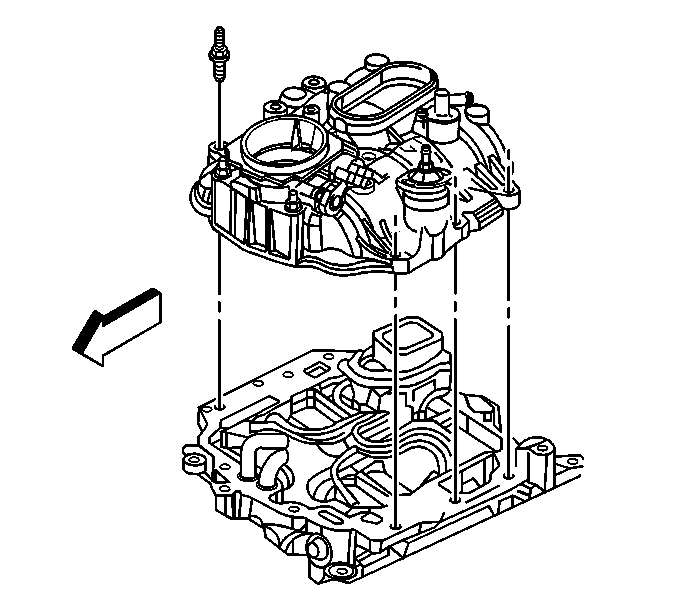
- Remove the studs for the
upper intake manifold.
- Remove the upper intake manifold.
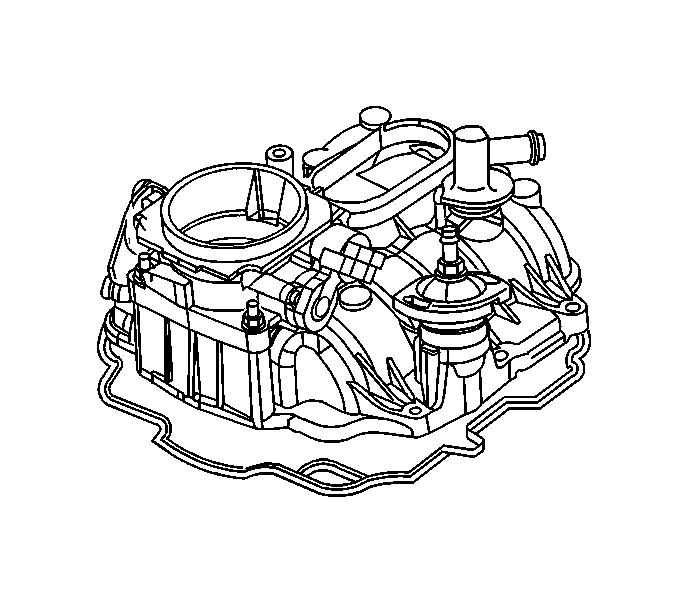
- Remove the upper intake
manifold gasket from the groove.
- Discard the gasket.
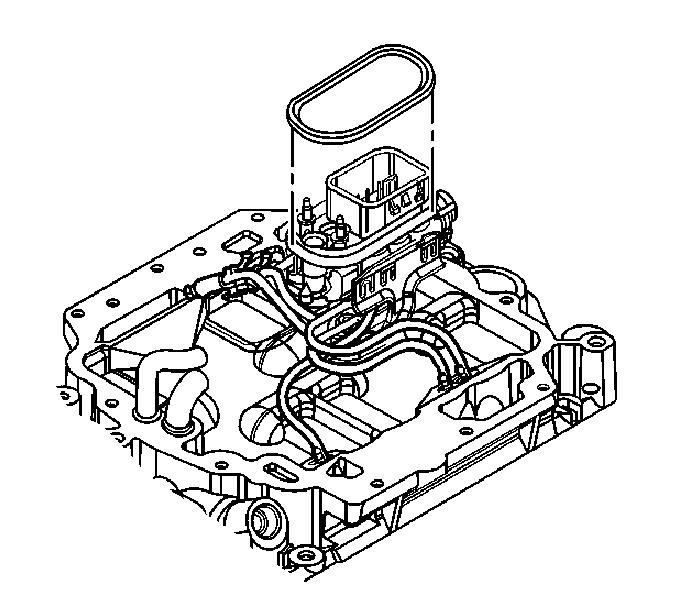
- Remove the seal from the
fuel meter body assembly.
- Discard the seal.
Important: Do not immerse the assembled upper intake manifold in cleaning solvent.
- Clean all sealing surfaces and the inside of the upper intake manifold
with a shop towel and cleaning solvent.
- Inspect the upper intake manifold for the following:
| • | Cracks or other damage to the exterior |
| • | Cracking or damage to the gasket grooves |
| • | Loose or damaged bolt hole thread inserts |
| • | Damage to the throttle body mounting surface |
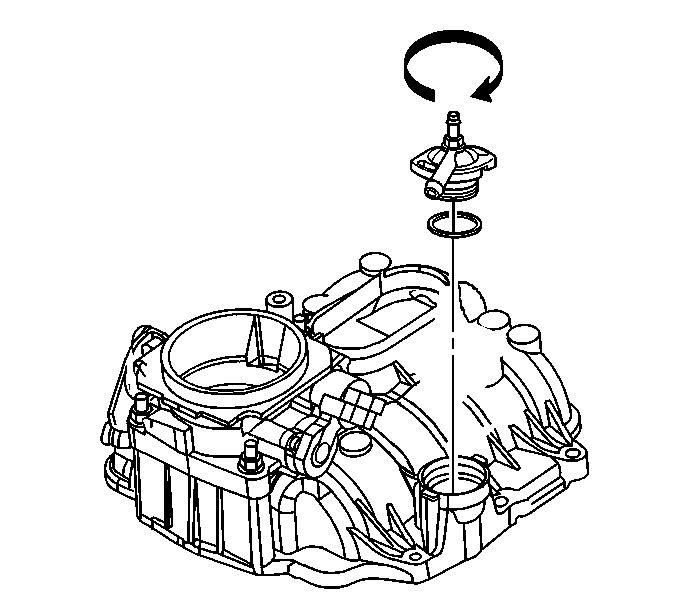
- If replacing the upper
intake manifold, turn and remove the power brake booster vacuum tube fitting
from the upper intake manifold.
- Remove and discard the seal.
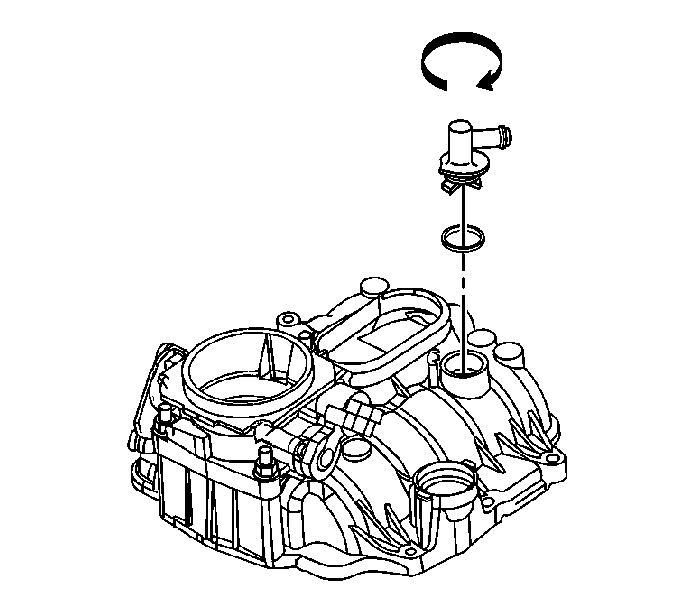
- If replacing the upper
intake manifold, turn and remove the PCV valve cover from the upper intake
manifold.
- Remove and discard the seal.
- Remove the throttle body if replacing the upper intake manifold.
Refer to
Throttle Body Assembly Replacement
in Engine Controls.
- Remove the MAP sensor if replacing the upper intake manifold.
Refer to
Manifold Absolute Pressure Sensor Replacement
in Engine Controls.
Installation Procedure

- Install the throttle body,
if removed. Refer to
Throttle Body Assembly Replacement
in Engine Controls.
- Install the MAP sensor, if removed. Refer to
Manifold Absolute Pressure Sensor Replacement
in Engine
Controls.
- Install the PCV valve cover, if removed, using the following procedure:
| 3.1. | Install a NEW seal (O-ring) on the PCV valve cover. |
| 3.2. | Lubricate the seal with clean engine oil. |
| 3.3. | Install the PCV valve cover in the upper intake manifold. |
| 3.4. | Turn and lock the PCV valve cover in position. |

- Install the power brake
booster vacuum tube fitting, if removed, using the following procedure:
| 4.1. | Install a NEW seal (O-ring) on the power brake booster vacuum
tube fitting. |
| 4.2. | Lubricate the seal with clean engine oil. |
| 4.3. | Install the power brake booster vacuum tube fitting in the upper
intake manifold. |
| 4.4. | Turn and lock the power brake booster vacuum tube fitting in
position. |

- Install a NEW seal on
the fuel meter body assembly.
- Lubricate the seal with clean engine oil.

- Install a NEW upper intake
manifold to lower intake manifold gasket in the groove of the upper intake
manifold.

- Install the upper intake
manifold onto the lower intake manifold.
- If reusing the fasteners, apply threadlock GM P/N 12345382
or equivalent to the threads of the upper intake manifold attaching bolts.
Notice: Use the correct fastener in the correct location. Replacement fasteners
must be the correct part number for that application. Fasteners requiring
replacement or fasteners requiring the use of thread locking compound or sealant
are identified in the service procedure. Do not use paints, lubricants, or
corrosion inhibitors on fasteners or fastener joint surfaces unless specified.
These coatings affect fastener torque and joint clamping force and may damage
the fastener. Use the correct tightening sequence and specifications when
installing fasteners in order to avoid damage to parts and systems.
- Install the upper intake manifold attaching studs.
Tightening
- Tighten the upper intake manifold attaching studs on the first
pass to 5 N·m (44 lb in).
- Tighten the upper intake manifold attaching studs on the final
pass to 9 N·m (80 lb in).
- Install the fuel lines to the fuel meter body assembly. Refer
to
Fuel Hose/Pipes Replacement - Engine Compartment
in Engine Controls.
- Install the EVAP canister purge solenoid valve. Refer to
Evaporative Emission Canister Purge Solenoid Valve Replacement
in Engine Controls.

- Install the bracket for
the engine wiring harness on the lower intake manifold stud.
- Install the engine wiring harness bracket nut.
Tighten
Tighten the engine wiring harness bracket nut to 12 N·m
(106 lb in).

- Install the accelerator
and cruise control cable bracket to the throttle body.
- Install the accelerator and cruise control cable bracket nuts.
Tighten
Tighten the accelerator and cruise control cable bracket nuts to 9 N·m
(80 lb in).

- Install the accelerator
control cable bracket to the throttle body and the intake manifold.
Tighten
Tighten the accelerator control cable bracket studs and nuts to 12 N·m
(106 lb in).

- Connect the PCV valve
hose assembly to the intake manifold and the valve rocker arm cover.

- Position the engine wiring
harness.
- Install the wire harness clip to the accelerator cable bracket.
- Connect the following electrical connectors:
| • | The fuel meter body assembly (1) |
| • | The manifold absolute pressure (MAP) sensor (3) |
| • | The EVAP canister purge solenoid valve (2) |

- Connect the following
electrical connectors:
| • | The A/C compressor clutch (1) |
| • | The A/C compressor cutoff switch (5), if equipped |
| • | The throttle position (TP) sensor (2) |
| • | The idle air control (IAC) motor (3) |

- Connect the vacuum hose
from the vacuum tank to the intake manifold.
- Install the power brake booster vacuum hose to the intake manifold.
- Install the cruise control cable, if equipped to the throttle
shaft and the bracket. Refer to
Cruise Control Cable Replacement
in Cruise Controls.
- Install the accelerator control cable to the throttle shaft and
the bracket. Refer to
Accelerator Control Cable Replacement
in Engine Controls.
- Install the air cleaner outlet duct to the throttle body assembly.
Refer to
Air Cleaner Outlet Duct Replacement
in Engine Controls.
Intake Manifold Replacement Lower
Removal Procedure
Important: You do not have to remove the upper intake manifold in order to remove
the lower intake manifold.
- Disconnect the battery negative cable. Refer to
Battery Replacement
in Engine Electrical.
- Remove the air cleaner outlet duct from the throttle body. Refer
to
Air Cleaner Outlet Duct Replacement
in Engine Controls.
- Disconnect the accelerator control cable from the throttle shaft
and the accelerator cable bracket. Refer to
Accelerator Control Cable Replacement
in Engine Controls.
- Disconnect the cruise control cable, if equipped from the throttle
shaft and the accelerator cable bracket. Refer to
Cruise Control Cable Replacement
in Cruise Control.

- Disconnect the vacuum
hose from the intake manifold, if equipped with A/C.
- Disconnect the power brake booster vacuum hose
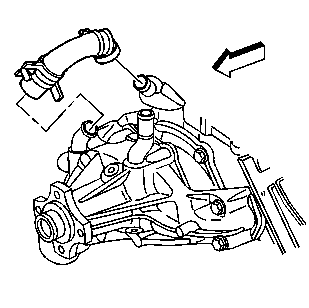
- Drain the cooling system. Refer to
Cooling System Draining and Filling
in Engine Cooling.
- Remove the radiator inlet hose at the water outlet. Refer to
Radiator Hose Replacement
in Engine Cooling.
- Remove the heater hose from the intake manifold. Refer to
Heater Hoses Replacement
in Heating Ventilation
and Air Conditioning.
- Remove the water pump inlet hose form the intake manifold.

- Disconnect the following
electrical connectors:
| • | The fuel meter body assembly (1) |
| • | The EVAP canister purge solenoid valve (2) |
| • | The manifold air pressure (MAP) sensor (3) |
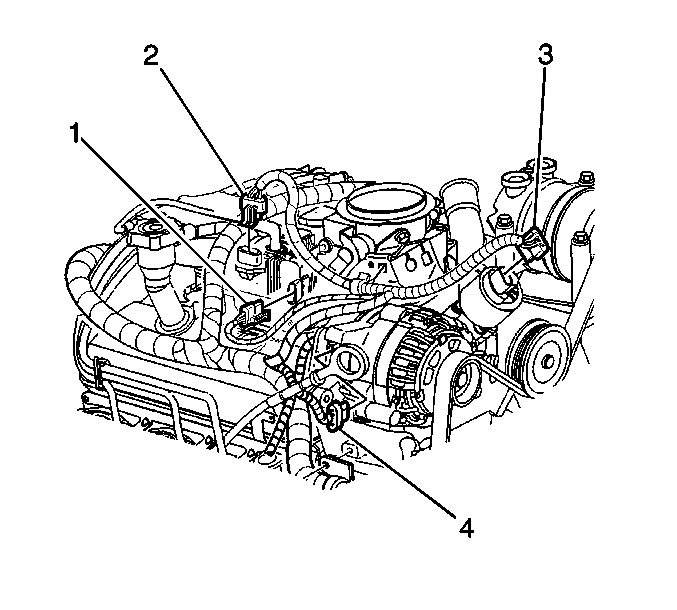
- Disconnect the following
electrical connectors:
| • | The exhaust gas recirculation (EGR) valve (3) |
| • | The ignition control module (ICM) (1) |

- Disconnect the following
electrical connectors:
| • | The idle air control (IAC) motor (3) |
| • | The throttle position (TP) sensor (2) |
| • | The A/C compressor cutoff switch, if equipped (5) |
| • | The A/C clutch switch, if equipped (1) |
| • | The engine coolant temperature (ECT) sensor (4) |
- Remove the engine wiring harness clips from the brackets.
- Move the engine wiring harness aside.

- Remove the accelerator
cable bracket from the throttle body and the intake manifold.

- Remove the accelerator
and the cruise control cable bracket from the throttle bracket.
Leave the accelerator and cruise control cables on the bracket.

- Disconnect the PCV hose
assembly from the intake manifold and the valve rocker arm cover.
- Remove the EVAP canister purge solenoid valve. Refer to
Evaporative Emission Canister Purge Solenoid Valve Replacement
in Engine Controls.
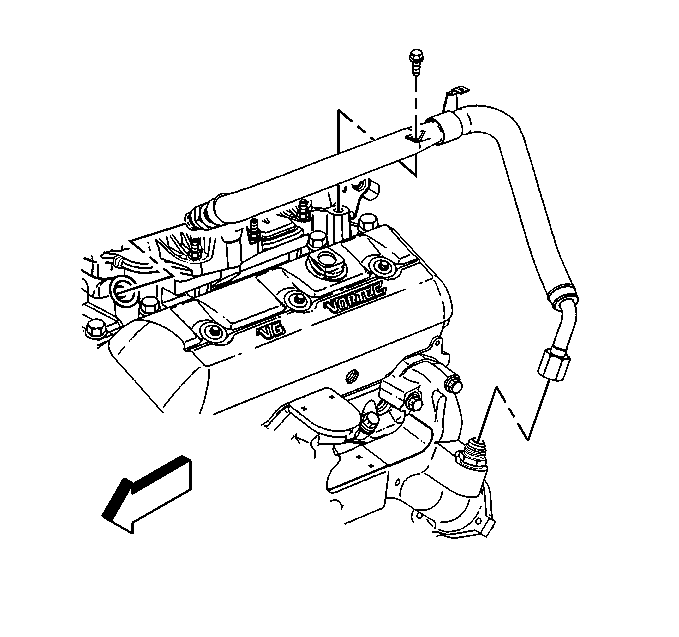
- Remove the spark plug
wire harness retainer from the exhaust gas recirculation (EGR) valve inlet
pipe.
- Remove the clamp bolt for the EGR valve inlet pipe.
- Remove the EGR valve inlet pipe from the intake and the exhaust
manifolds.
- Remove the distributor. Refer to
Distributor Replacement
in Engine Electrical.
- Disconnect the fuel supply and return pipes at the rear of the
intake manifold. Refer to
Fuel Hose/Pipes Replacement - Engine Compartment
in Engine Controls.
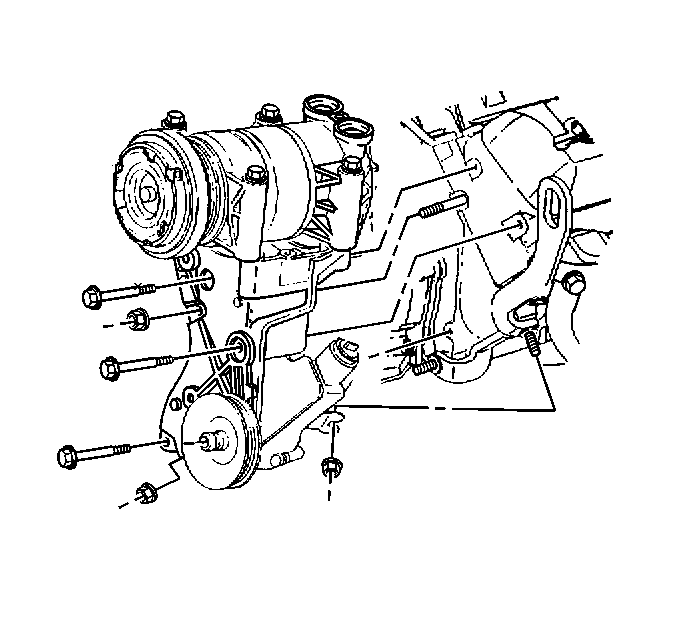
Important: Do not discharge the refrigerant.
- Perform the following in order to remove the left front bolt for the
intake manifold:
| 25.2. | Loosen the nut for the power steering pump rear bracket at the
side of the engine. |
| 25.3. | Remove the secondary air injection (AIR) reactor pipe bracket
nut from the power steering pump rear bracket front stud, if equipped. |
| 25.4. | Remove the nut for the power steering pump rear bracket at the
front of the engine. |
| 25.5. | Remove the bolts and the nut for the power steering pump mounting
bracket. |
| 25.6. | Leave the A/C compressor, if equipped, and the power steering
pump on the power steering pump mounting bracket. |
| 25.7. | Slide the power steering pump bracket forward to access the bolt
at the front of the intake manifold. |
- Remove the lower intake manifold. Refer to
Intake Manifold Removal
.
- Disassemble the intake manifold assembly if replacing the lower
intake manifold. Refer to
Intake Manifold Disassemble
.
Important: Do not immerse the assembled intake manifold in cleaning solvent.
- Clean all sealing surfaces. Refer to
Intake Manifold Cleaning and Inspection
.
Installation Procedure
- Assemble the intake manifold assembly if replacing the lower intake
manifold. Refer to
Intake Manifold Assemble
.
- Install the lower intake manifold. Refer to
Intake Manifold Installation
.

- Position the power steering
pump mounting bracket.
- Loosely install the power steering pump mounting bracket bolts
and nuts.
Notice: Use the correct fastener in the correct location. Replacement fasteners
must be the correct part number for that application. Fasteners requiring
replacement or fasteners requiring the use of thread locking compound or sealant
are identified in the service procedure. Do not use paints, lubricants, or
corrosion inhibitors on fasteners or fastener joint surfaces unless specified.
These coatings affect fastener torque and joint clamping force and may damage
the fastener. Use the correct tightening sequence and specifications when
installing fasteners in order to avoid damage to parts and systems.
- Install the nut for the power steering pump rear bracket at the front
of the engine.
Tighten
Tighten the power steering pump mounting bracket bolts and the power
steering pump rear bracket nuts to 41 N·m (30 lb ft).
- Install the AIR reactor pipe bracket nut to the power steering
pump rear bracket front stud, if equipped.
Tighten
Tighten the AIR reactor pipe bracket nut to 41 N·m (30 lb ft).
- Install the drive belt. Refer to
Drive Belt Replacement
.
- Install the fuel supply and return pipes to the rear of the intake
manifold. Refer to
Fuel Hose/Pipes Replacement - Engine Compartment
in Engine Controls.
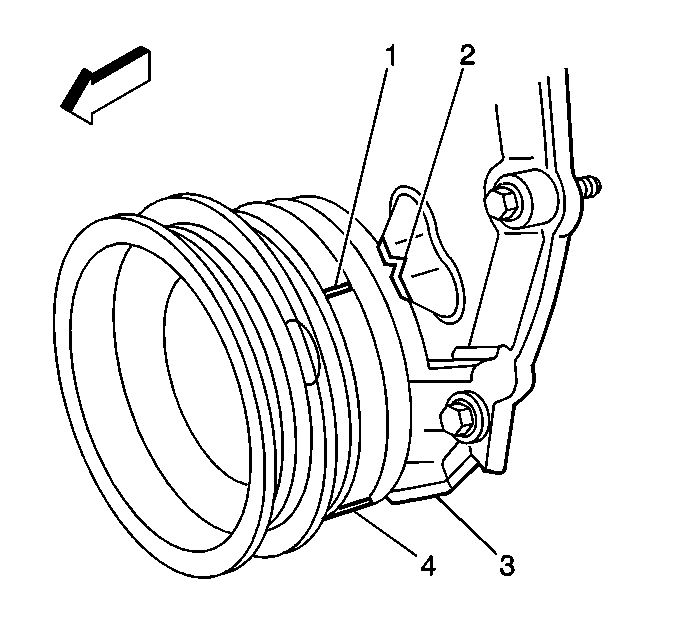
Important: In order to install the distributor for the correct engine timing, position
the engine to number one cylinder top dead center.
- Remove the spark plug for number one cylinder.
- Rotate the crankshaft until number one cylinder is in the compression
stroke.
- Align the two reference marks on the crankshaft balancer (1) and
(4) with the two alignment marks (2) and (3) on the front cover.
- Install the spark plug. Refer to
Spark Plug Replacement
in Engine Electrical.
- Install the distributor. Refer to
Distributor Replacement
in Engine Electrical.
- Install the EVAP canister purge solenoid valve. Refer to
Evaporative Emission Canister Purge Solenoid Valve Replacement
in Engine Controls.

- Install the EGR valve
inlet pipe to the intake manifold and the exhaust manifold.
Tighten
- Tighten the EGR valve inlet pipe intake manifold nut to 25 N·m
(18 lb ft).
- Tighten the EGR valve inlet pipe exhaust manifold nut to 30 N·m
(22 lb ft).
- Tighten the EGR valve inlet pipe clamp bolt 25 N·m
(18 lb ft).
- Install the spark plug wire harness retainer on the EGR valve
inlet pipe.

- Install the PCV hose assembly
to the intake manifold and the valve rocker arm cover.

- Install the accelerator
cable and cruise control cable bracket to the throttle body.
Tighten
Tighten the accelerator cable and cruise control bracket nuts to 9 N·m
(80 lb in).

- Install the accelerator
cable bracket to the intake manifold and the throttle body.
Tighten
Tighten the accelerator cable bracket studs and nuts to 12 N·m
(106 lb in).

- Position the engine wiring
harness.
- Install the engine wiring harness clips in the brackets.
- Connect the following electrical connectors:
| • | The idle air control (IAC) motor (3) |
| • | The throttle position (TP) sensor (2) |
| • | The A/C compressor cutoff switch, if equipped (5) |
| • | The A/C clutch switch, if equipped (1) |
| • | The engine coolant temperature (ECT) sensor (4) |

- Connect the following
electrical connectors:
| • | The fuel meter body assembly (1) |
| • | The EVAP canister purge solenoid valve (2) |
| • | The manifold air pressure (MAP) sensor (3) |

- Connect the following
electrical connectors:
| • | The exhaust gas recirculation (EGR) valve (3) |
| • | The ignition control module (ICM) (1) |

- Connect the power brake
booster vacuum hose.
- Connect the vacuum hose to the intake manifold, if equipped with
A/C.

- Install the water pump inlet hose to the intake manifold.
- Install the heater hose to the intake manifold. Refer to
Heater Hoses Replacement
in Heating Ventilation
and Air Conditioning.
- Install the radiator inlet hose to the water outlet. Refer to
Radiator Hose Replacement
in Engine Cooling.
- Install the accelerator control cable to the bracket and the throttle
shaft. Refer to
Accelerator Control Cable Replacement
in Engine Controls.
- Install the cruise control cable, if equipped to the bracket and
the throttle shaft. Refer to
Cruise Control Cable Replacement
in Cruise Control.
- Fill the cooling system. Refer to
Cooling System Draining and Filling
in Engine Cooling.
- Install the air cleaner outlet duct to the throttle body. Refer
to
Air Cleaner Outlet Duct Replacement
in Engine Controls.
- Connect the battery negative cable. Refer to
Battery Replacement
in Engine Electrical.













































